
views
- Reintroduce meat to your diet slowly. Start with a light meat like fish and slowly work your way up to red meat.
- Add meat to your diet in small portions. Eating large servings of meat right away might lead to bloating and constipation.
- If you’re hesitant to eat meat again, start by adding bone or chicken broth to your favorite recipes.
Can you go back to eating meat after being vegetarian?

Yes, your body does not lose the ability to digest meat. No matter how long you’ve been a vegetarian, you can always go back to eating meat. You may feel a little “heavy” after your first meal with meat, especially if you have a large portion. But, you won’t actually be unable to digest and metabolize the meat.
Do vegetarians get sick when they eat meat?
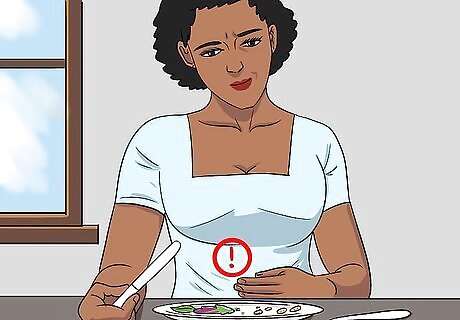
No, but you may have an upset stomach if you overdo it. Plants are easier to digest than meat and require fewer digestive enzymes to break them down. If you suddenly switch back to eating meat, you might not have sufficient digestive enzymes to handle meat, which can cause some physical discomfort. Going slowly and starting with small portions of meat will make the process easier. Because meat has a higher fat content than plants, it takes longer to digest. You might experience constipation and/or bloating. Sometimes, you might experience breakouts or heartburn when you start eating meat again.
What meats should I reintroduce first after being a vegetarian?

Start with lighter meats and introduce different meats one at a time. Start with a light meat like fish, and then try something like poultry. Work your way up slowly to heavier meats like red meat. This gives your body time to adjust so you won’t have any digestive issues. It’s not an exact science, so choose to eat what you’re craving and what feels right for you. Just try to avoid a super large cut of meat so you won’t have any digestive discomfort. If you’ve been a vegan for a long time, or you’ve been following a strict plant-based diet, start with something lighter such as chicken broth or eggs.
Should I limit how much meat I eat after being a vegetarian?

Eat small portions at first and listen to your body. Eating meat after being a vegetarian won’t make you sick, but diving immediately into a giant steak can cause some discomfort, like bloating and a stomach ache. Try out a small serving and see how you feel. If you don’t feel bloated or have indigestion, try having more. Pay attention to how your body responds and don’t overdo it. Don’t feel like you have to jump into meat-based meals right away. Instead, try adding animal products to plant-based meals. For example, add bone broth to your favorite soup or make a chickpea pasta salad with a tablespoon of tuna. If you find that heavy meats like red meat cause discomfort, consider starting with a pescatarian diet (seafood only) or a flexitarian diet, in which you only eat meat occasionally.
How do I prevent digestion issues when I eat meat after being a vegetarian?
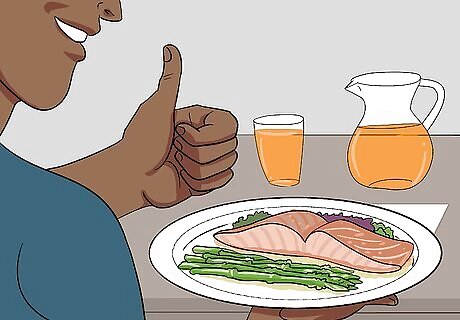
Choose higher-fat cuts of meat to help with digestion. Super lean cuts of meat can be tougher and more difficult for your body to process, especially if you haven’t eaten meat in a long time. When you’re getting back into eating meat again, choose fattier cuts for more flavor and to help your body absorb more of the essential vitamins and minerals. For example, you might go with a higher-fat fish like salmon or herring over lean fish like tilapia and halibut.
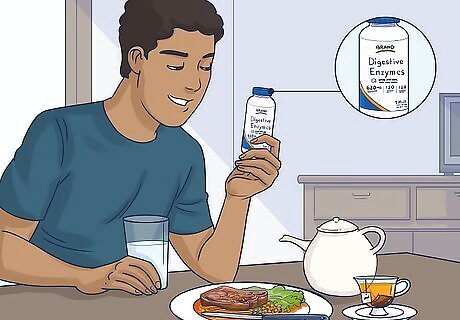
Take digestive enzymes to help support your digestion. Eating meat again can make you feel “heavy” and a little bloated at first. Digestive enzymes help break down your food, so they can help you digest meat more easily and with less discomfort. Pick up digestive enzymes at your local health food or vitamin store and take them according to the recommendations on the packaging. Papaya is a great natural digestive enzyme if you don’t want to buy supplements. If you do experience discomfort, try some mint or chamomile tea to reduce bloating.
How do I make eating meat more appealing after being a vegetarian?

Order cooked meals so you don’t have to handle raw meat. If you aren’t used to handling or preparing meat, it can be really off-putting and may spoil your appetite. Instead, order takeout or go to a restaurant when you start eating meat again. You may want to avoid sushi if raw fish is unappealing to you.

Try eating at a friend or family member’s house. Let your loved ones know you’re trying to eat meat again but you aren’t ready to prepare it yourself. They can prepare a meal for you, and eating it together will help you feel supported.
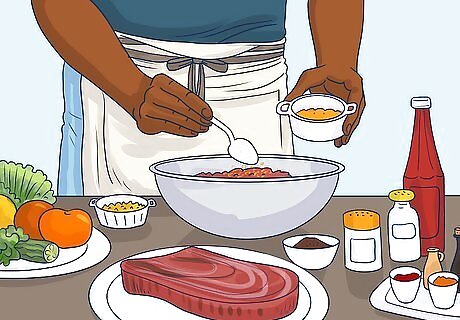
Boost the flavor with seasoning and sauces. There are a ton of seasonings that can help make meat more delicious such as pepper, paprika, salt, garlic, onion, and many more. There are also a bunch of sauces that go great with meat such as barbecue, ketchup, ranch, and blue cheese. Use them! They can enhance the flavor of the meat and help make it more palatable if you don’t love the taste.
Do most vegetarians go back to eating meat?
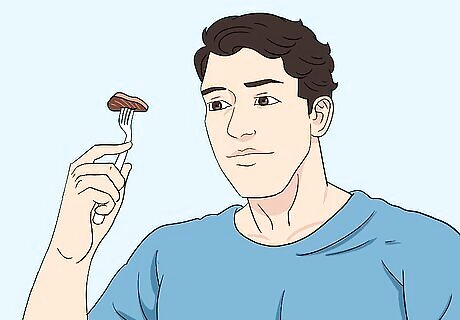
Yes, studies suggest that 84% of vegetarians go back to eating meat. It’s really common for folks who follow a vegetarian or a vegan diet to eventually return to eating meat. One study found that there are more than 5 times as many former vegetarians and vegans as there are current ones. That doesn’t mean you’ll eventually go back to eating meat, but you aren’t alone if you do choose to do so. There are countless reasons someone might start eating meat again. One person might need to get more calories and protein, while another may simply miss the taste. Regardless of the reason, no one should feel ashamed or guilty for deciding to reintroduce meat to their diet.
How can I stop feeling bad about eating meat after being a vegetarian?

Keep in mind your reasons for eating meat again. If you have to eat meat for health reasons, think about the benefits that you’ll get from it such as feeling better physically and being able to spend more time with people you love and care about. Your body is able to process meat, so it’s a natural part of many people’s diets. You aren’t doing anything wrong and you shouldn’t feel guilty about eating meat. Many people are vegetarians for moral reasons, so it can really make them upset if they have to start eating meat again. Consider the health benefits of eating meat. Sometimes, eating meat can reduce sugar cravings and improve iron and vitamin B12 levels. You may also feel full more quickly and experience fewer spikes in blood sugar.
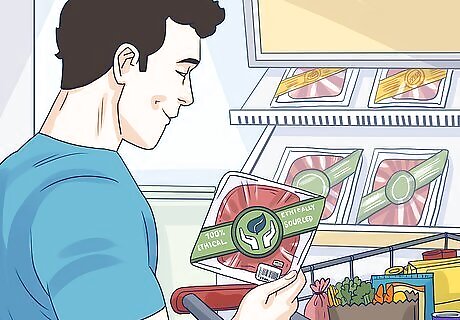
Choose ethically sourced meats. If you went meat-free for moral reasons like inhumane conditions at factory farms, you may feel less guilty about eating meat again if you know where it came from. Select grass-fed and free-range meat from the grocery store, or research farms in your area to find farm-to-consumer mail-order options.

Talk to your doctor or dietitian about your concerns. It’s a good idea to talk to your doctor about any diet changes, including reintroducing meat to your diet. Your doctor can address any questions you have, help you make informed decisions, and reassure you that you’re not doing anything wrong.

Find community with other former vegetarians. As mentioned above, 84% of vegetarians go back to eating meat, so try to find someone who can empathize with your experience. Even if you don’t know anyone in person, a simple Facebook search for “recovering vegans” or “recovering vegetarians” can help you find numerous online communities.


















Comments
0 comment